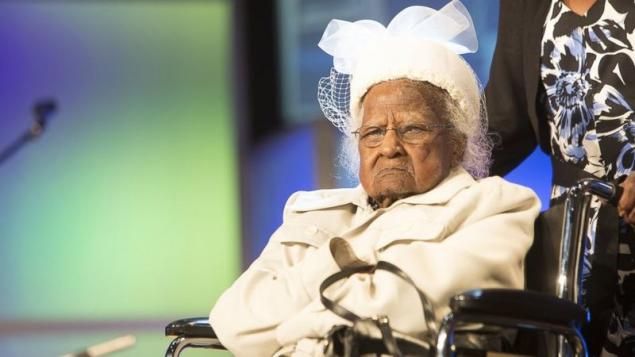747
What would happen if a 100-year life will be included in the order of things
Geralyn Tully until his death June 17, 2015 at the age of 116 years, was the oldest person in the world. What if this long life would be in order? A large part of human history, life expectancy has never been long. But thanks to the incredible achievements performed for the last time, jump to the mark in 100 years has ceased to seem fantastic, and became almost inevitable. More than a hundred years ago, the average life expectancy in developed countries was 49: 24 describes. In 2012, she was on the mark at 78.8.

If our biology limits the maximum duration of human life, we have not yet reached the limit. While our progress is not strongly linked to good adult behavior or medical advances. Although many people think that life before the 20th century was quite short, because all around were cut with axes and divided tuberculosis, the truth is that life expectancy increases dramatically with increasing the security of childhood. And in this we succeeded.
In 1900, for every 1,000 newborns had 165 child deaths. If you were born in that time, you would have a chance 1 in 10 die before their first birthday, and this statistic has significantly reduced life expectancy. Today, even in Afghanistan — the highest rate of child mortality, 117,23 deaths per 1000 is significantly lower. In America, the average is 6.17 deaths per 1000 is pretty high for a developed country. In Russia To 10.7. To find statistics for all countries you can, for example, on Wikipedia. In addition, if you grow up in a developed country, you are unlikely to die to eight years from disease of the lungs, obtained at the factory for the production of knives.
Thus, the avoidance of dangers at an early age increases the average duration of human life. There are other factors. While most people thank you medical advances (like antibiotics, chemotherapy etc.) for our long life, historians tend to assess the achievements of the society: clean water, hand washing, improving sanitary standards for food and fight bacteria. All of this has come a long way on the way to our longevity. In our hypothetical world of a century the people are very, very few would take the risk for the life of the solution, or at least to postpone them for up to 90 years. People do not smoke or drink. Don't eat everything. Perform moderate amount of exercise, often go to the doctor. Then the chances for a long life are pretty good.
Sounds cool, right? A long, happy life. And yet, what are the consequences if a 100-year life will be included in the order of things in our society?
For a start it can make us smarter. Most primates have relatively long periods of juvenility, because young primates learn social, language and other skills necessary for survival. The life in a century will increase the period minority that we are, in principle, already do, by introducing laws against child labour and an education system that works longer than puberty person. We have to reconsider the approach to "children" and spend more time focusing on learning to become wise adults.
But will sentence whether the extended life — when old people will live longer, even if will be born baby us to overpopulation? No. In fact, there is a strong connection between a large number of elderly and fewer children. In Hong Kong, for example, people live very long — on average, at 82.8 years in 2014. Also there is not so many children, only 1.1 child average per woman. As a rule, for achieving a stable population, each woman should have around 2.1 children. Among the 20 Nations with the longest life expectancy, including Israel, the birth rate exceeds the 2.1 children per woman. In 2015 nearly half the world's population lives in countries with insufficient fertility — when generation brings enough children to replace people — and this figure is expected to grow by 82% by the end of the century. It seems, from this side, we're safe.
It also does not mean that 100-year life will not cause problems with the population, especially considering the birth of fewer children. Economy pushed birth and relies on a constant influx of new workers. If the birth rate is low for long enough, will stagnate and decline of the national economy. Worsens also the point that a large percentage of the population will spend a third of your life in retirement. Even if you raise the retirement age to, say, 85 years, care for seniors will require a lot of energy and resources.
Developed countries are already feeling the stress associated with a reduction in birth rates and rising elderly population, as more people retire. The government has to bear the burden; support for older people is the task of government programs. The growing number of retirees could require increasing taxes in a faltering economy, and it will be good. However, with a falling birth rate more difficult to communicate than with a low level of fertility — in terms of the latter situation at least stabiliziruemost. The state and the economy will adapt. Life will go on. published
P. S. And remember, just changing your mind — together we change the world! ©
Source: hi-news.ru/science/esli-by-lyudi-zhili-do-100-let-chto-bylo-by.html

If our biology limits the maximum duration of human life, we have not yet reached the limit. While our progress is not strongly linked to good adult behavior or medical advances. Although many people think that life before the 20th century was quite short, because all around were cut with axes and divided tuberculosis, the truth is that life expectancy increases dramatically with increasing the security of childhood. And in this we succeeded.
In 1900, for every 1,000 newborns had 165 child deaths. If you were born in that time, you would have a chance 1 in 10 die before their first birthday, and this statistic has significantly reduced life expectancy. Today, even in Afghanistan — the highest rate of child mortality, 117,23 deaths per 1000 is significantly lower. In America, the average is 6.17 deaths per 1000 is pretty high for a developed country. In Russia To 10.7. To find statistics for all countries you can, for example, on Wikipedia. In addition, if you grow up in a developed country, you are unlikely to die to eight years from disease of the lungs, obtained at the factory for the production of knives.
Thus, the avoidance of dangers at an early age increases the average duration of human life. There are other factors. While most people thank you medical advances (like antibiotics, chemotherapy etc.) for our long life, historians tend to assess the achievements of the society: clean water, hand washing, improving sanitary standards for food and fight bacteria. All of this has come a long way on the way to our longevity. In our hypothetical world of a century the people are very, very few would take the risk for the life of the solution, or at least to postpone them for up to 90 years. People do not smoke or drink. Don't eat everything. Perform moderate amount of exercise, often go to the doctor. Then the chances for a long life are pretty good.
Sounds cool, right? A long, happy life. And yet, what are the consequences if a 100-year life will be included in the order of things in our society?
For a start it can make us smarter. Most primates have relatively long periods of juvenility, because young primates learn social, language and other skills necessary for survival. The life in a century will increase the period minority that we are, in principle, already do, by introducing laws against child labour and an education system that works longer than puberty person. We have to reconsider the approach to "children" and spend more time focusing on learning to become wise adults.
But will sentence whether the extended life — when old people will live longer, even if will be born baby us to overpopulation? No. In fact, there is a strong connection between a large number of elderly and fewer children. In Hong Kong, for example, people live very long — on average, at 82.8 years in 2014. Also there is not so many children, only 1.1 child average per woman. As a rule, for achieving a stable population, each woman should have around 2.1 children. Among the 20 Nations with the longest life expectancy, including Israel, the birth rate exceeds the 2.1 children per woman. In 2015 nearly half the world's population lives in countries with insufficient fertility — when generation brings enough children to replace people — and this figure is expected to grow by 82% by the end of the century. It seems, from this side, we're safe.
It also does not mean that 100-year life will not cause problems with the population, especially considering the birth of fewer children. Economy pushed birth and relies on a constant influx of new workers. If the birth rate is low for long enough, will stagnate and decline of the national economy. Worsens also the point that a large percentage of the population will spend a third of your life in retirement. Even if you raise the retirement age to, say, 85 years, care for seniors will require a lot of energy and resources.
Developed countries are already feeling the stress associated with a reduction in birth rates and rising elderly population, as more people retire. The government has to bear the burden; support for older people is the task of government programs. The growing number of retirees could require increasing taxes in a faltering economy, and it will be good. However, with a falling birth rate more difficult to communicate than with a low level of fertility — in terms of the latter situation at least stabiliziruemost. The state and the economy will adapt. Life will go on. published
P. S. And remember, just changing your mind — together we change the world! ©
Source: hi-news.ru/science/esli-by-lyudi-zhili-do-100-let-chto-bylo-by.html























